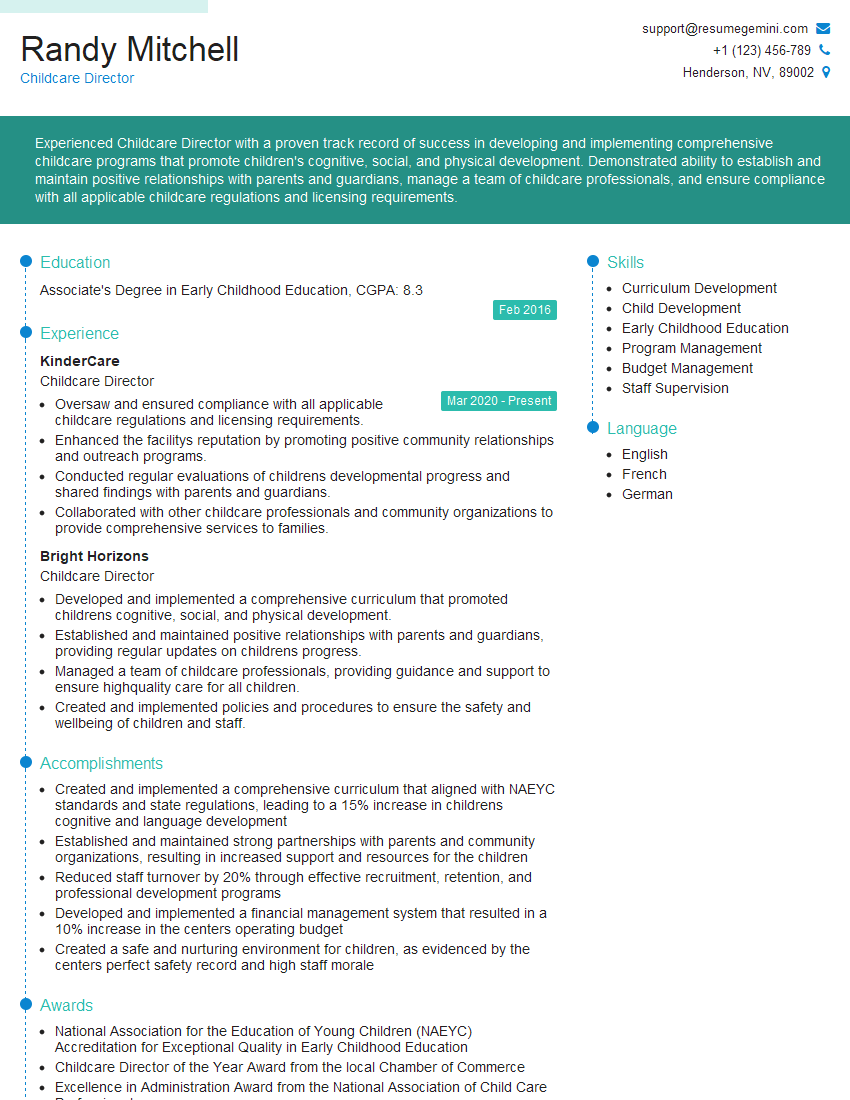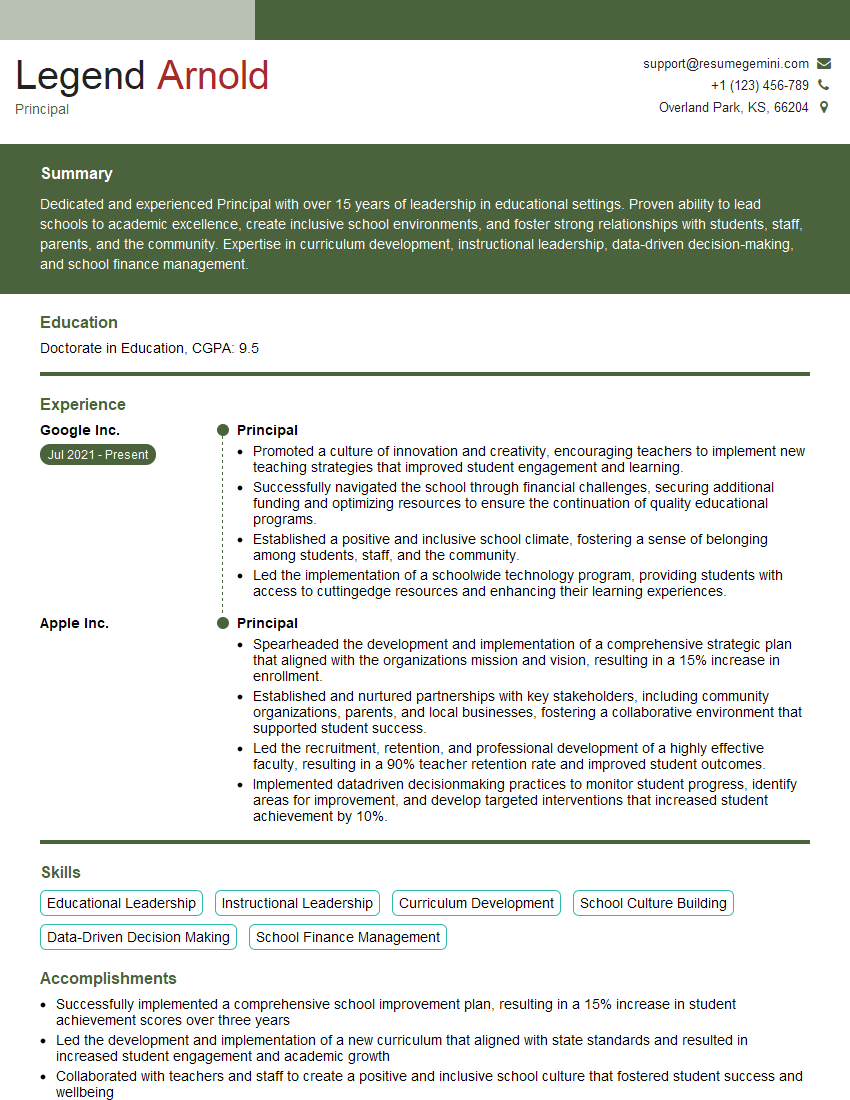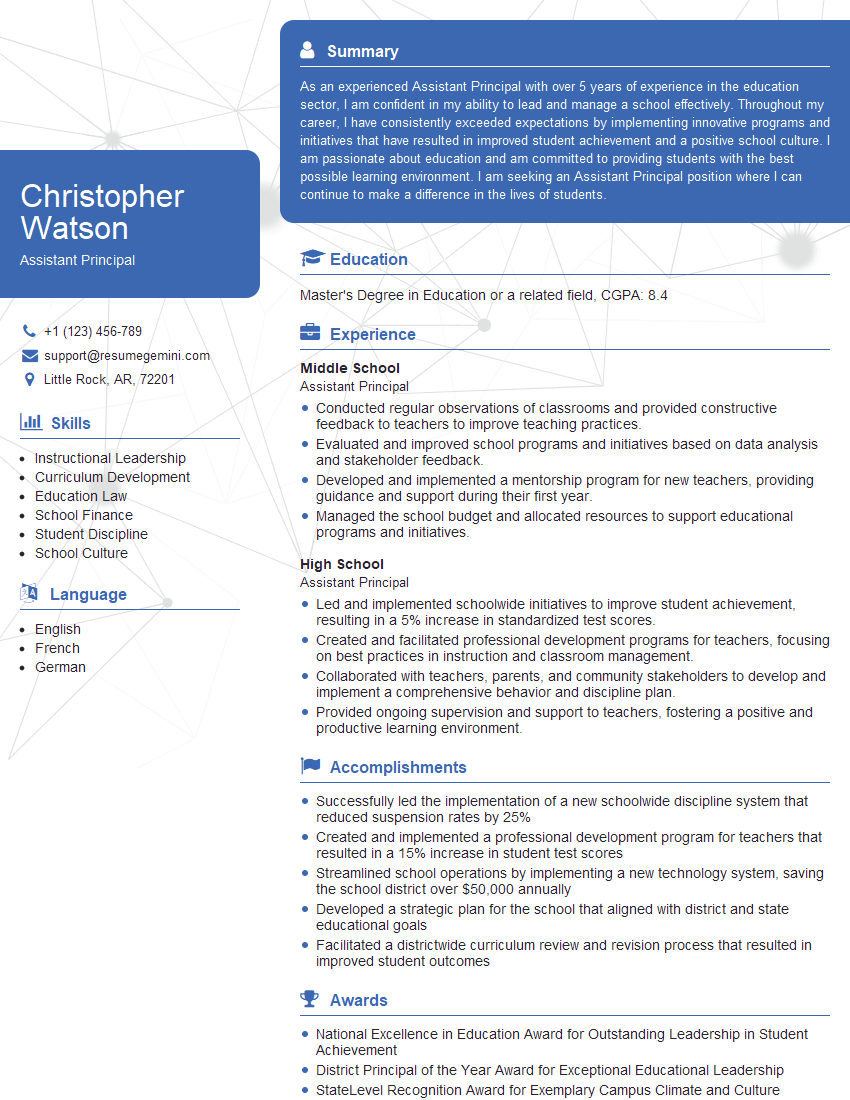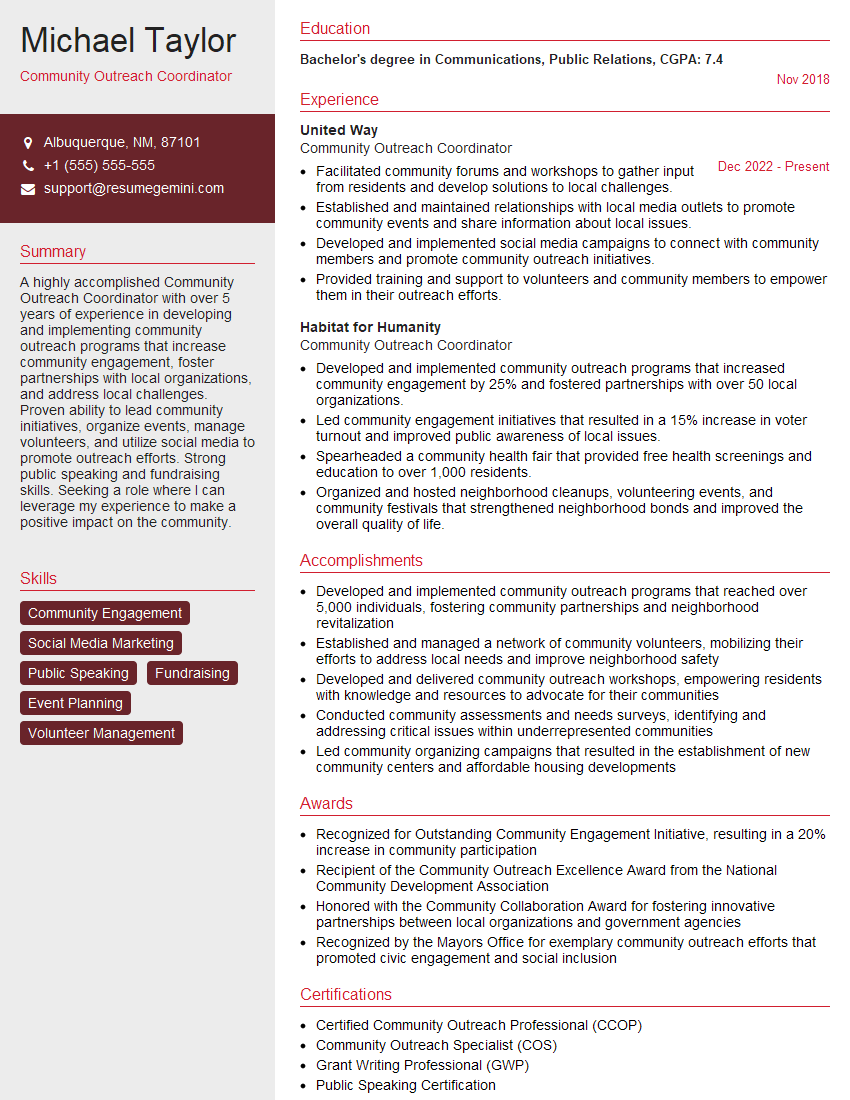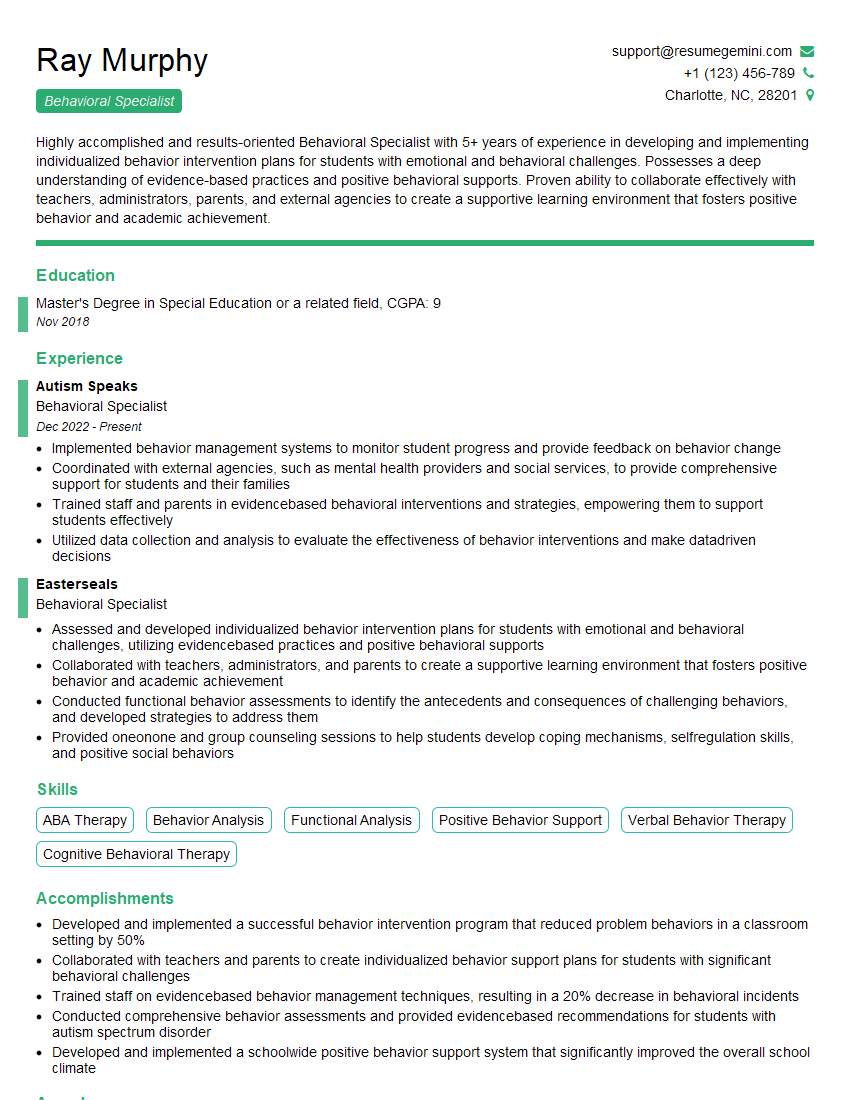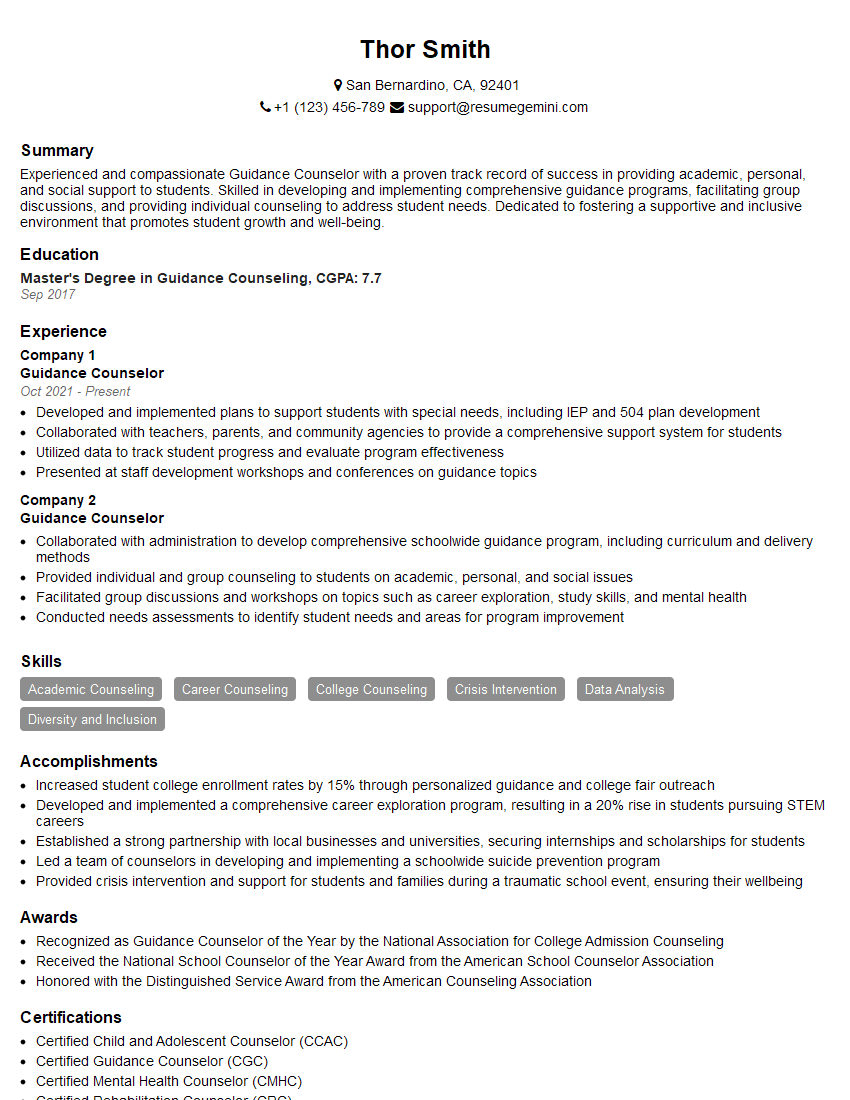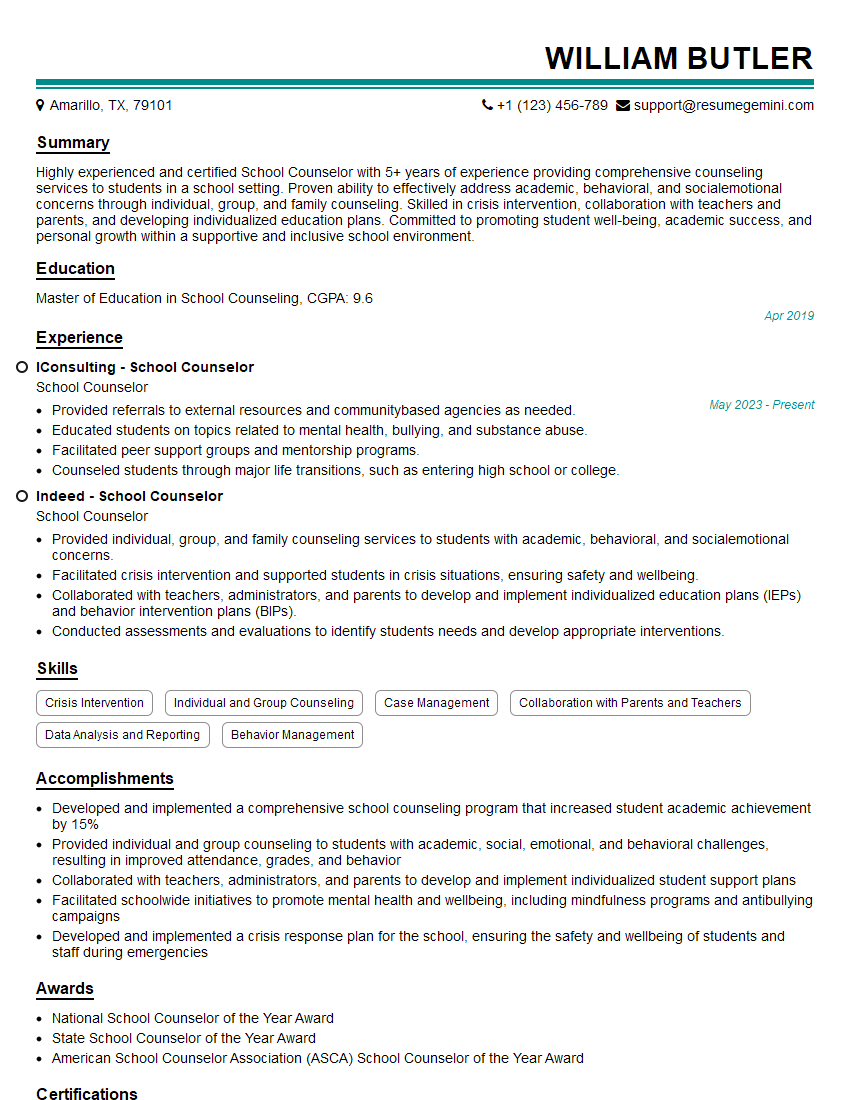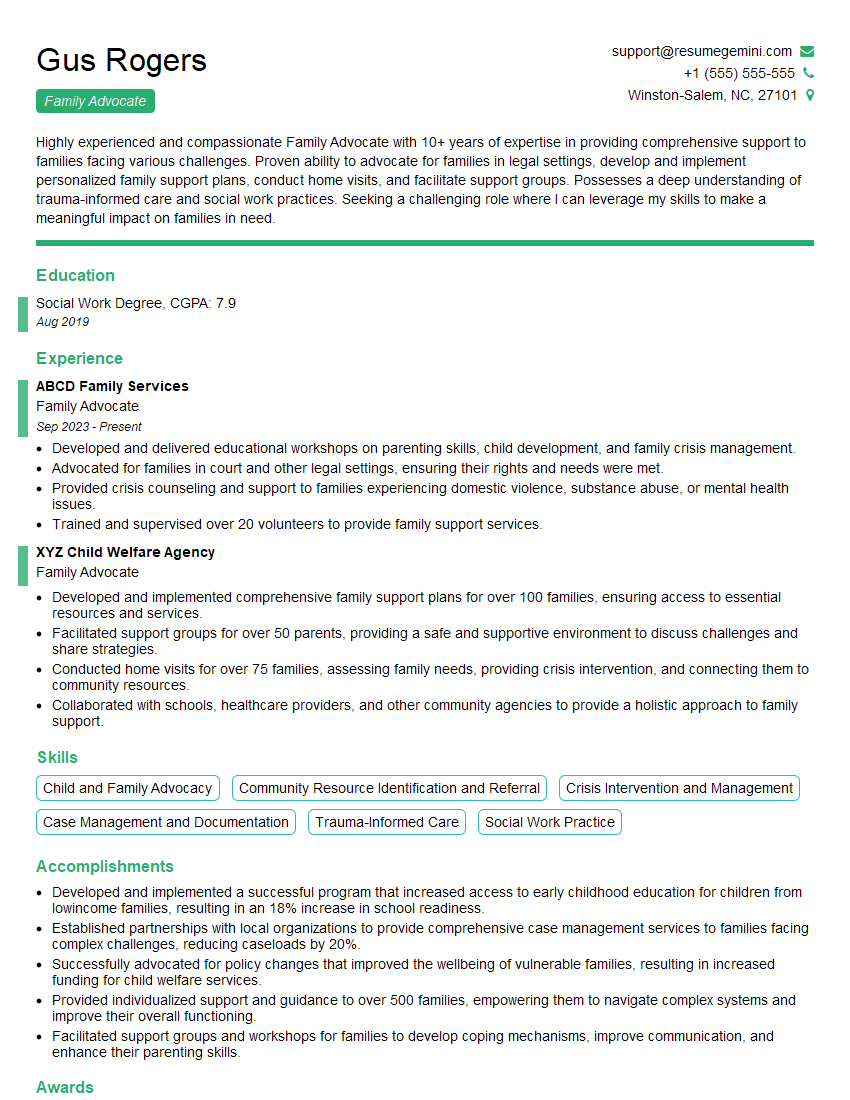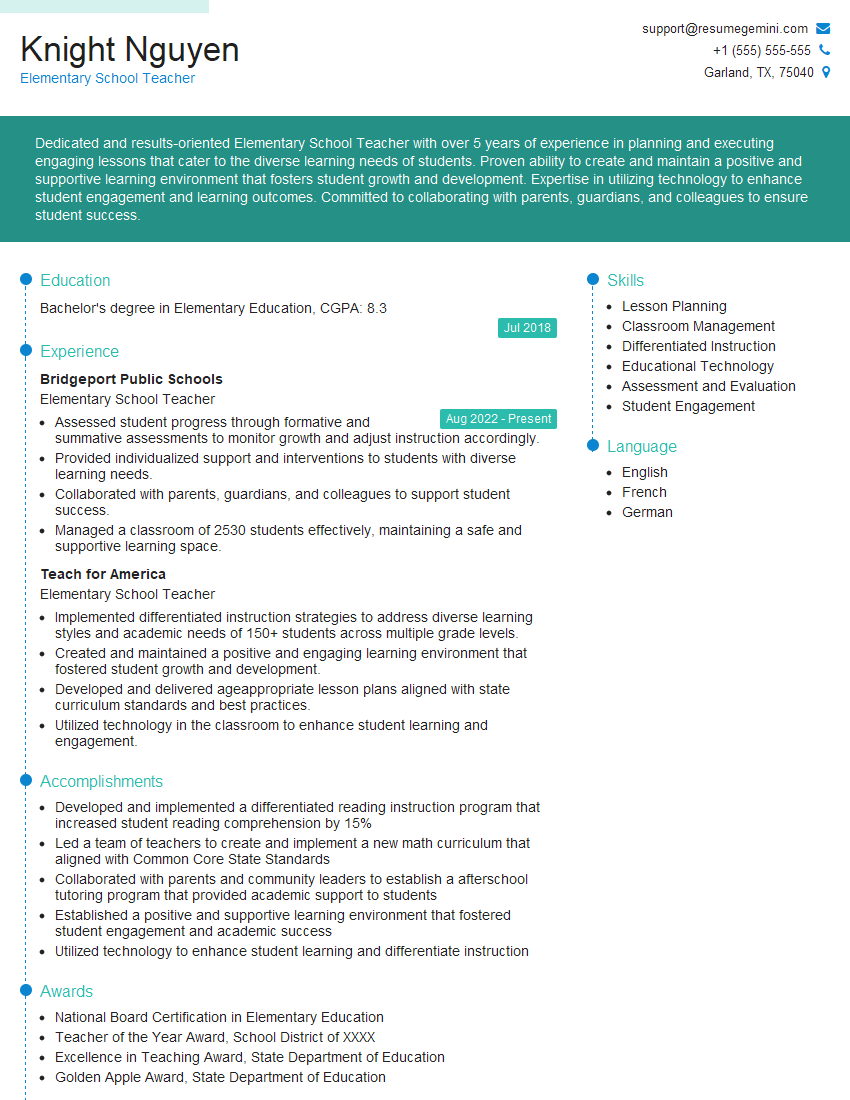Feeling uncertain about what to expect in your upcoming interview? We’ve got you covered! This blog highlights the most important Communicating with Parents and Guardians interview questions and provides actionable advice to help you stand out as the ideal candidate. Let’s pave the way for your success.
Questions Asked in Communicating with Parents and Guardians Interview
Q 1. Describe your preferred method for communicating with parents regarding student progress.
My preferred method for communicating student progress is a multi-faceted approach, prioritizing transparency and proactive engagement. I believe in regular, consistent communication, rather than relying on infrequent, large-scale updates.
Regular Updates (e.g., weekly emails or progress reports): Short, focused updates on academic performance, behaviour, and participation provide parents with a continuous understanding of their child’s progress. These are tailored to the specific needs of the student and family. For example, a quick note about a student’s exceptional work in a group project.
Parent-Teacher Conferences: These scheduled meetings allow for in-depth discussions about academic progress, social-emotional development, and areas where support is needed. It allows for a two-way conversation and the building of a collaborative relationship.
Informal Communication: Phone calls, emails, or brief chats during pick-up/drop-off provide opportunities for addressing immediate concerns or celebrating successes. For instance, a quick email to praise a student’s effort on a challenging assignment.
Digital Platforms: Utilizing learning management systems (LMS) or parent portals provides a centralized hub for accessing grades, assignments, announcements, and other relevant information. This ensures easy access and reduces the chance of missed information.
This comprehensive approach ensures parents are well-informed and actively involved in their child’s educational journey.
Q 2. How do you handle parent complaints or concerns effectively?
Handling parent complaints or concerns requires empathy, active listening, and a problem-solving approach. My strategy involves:
Active Listening: I start by attentively listening to the parent’s concerns without interruption, acknowledging their feelings and perspectives. This shows respect and creates a safe space for open communication. I might say something like, “I understand your frustration about this situation; let’s work together to find a solution.”
Clarifying the Issue: I ask clarifying questions to fully understand the nature and context of the complaint. This ensures I address the core issue, not just the surface symptoms. For instance, “Can you tell me more about what happened?”
Collaboratively Finding Solutions: I work with the parent to identify potential solutions, considering their input and my professional expertise. This collaborative approach emphasizes shared responsibility and empowers parents in the process. We can brainstorm together to find a course of action.
Following Up: After implementing a solution, I follow up with the parent to assess its effectiveness and address any remaining concerns. This demonstrates my commitment and reinforces the parent-teacher relationship.
Documentation: Maintaining detailed records of all communication and resolutions is crucial for accountability and to track the progress of the issue.
The goal is to resolve the issue fairly and efficiently, fostering a positive and trusting relationship with the parent.
Q 3. Explain your experience using technology to facilitate parent communication (e.g., email, portals).
I have extensive experience using technology to enhance parent communication. I’m proficient in using various platforms, including email, learning management systems (like Canvas or Moodle), and dedicated parent portals.
Email: I use email for quick updates, scheduling meetings, and addressing individual concerns. I always maintain a professional tone and ensure prompt responses.
Learning Management Systems (LMS): Platforms like Canvas or Moodle allow me to share assignments, grades, and announcements directly with parents, providing them with real-time access to their child’s academic progress.
Parent Portals: Dedicated parent portals offer a streamlined way to communicate important information, such as school calendars, newsletters, and policy updates. They often incorporate features that allow for direct messaging between teachers and parents.
My experience shows that effective use of technology significantly improves communication efficiency and transparency, fostering stronger parent-teacher relationships.
Q 4. How do you adapt your communication style to different parenting styles and cultural backgrounds?
Adapting my communication style to different parenting styles and cultural backgrounds is paramount. I approach this by:
Understanding Different Communication Styles: I am aware that some parents prefer direct communication while others are more indirect. Some may be highly involved while others prefer a more hands-off approach. I adapt my language and tone to match their communication preference.
Cultural Sensitivity: I am mindful of cultural norms and values that may influence communication styles. I research and understand the cultural backgrounds of the parents I interact with, ensuring that my communication is respectful and appropriate.
Building Rapport: Creating a trusting relationship with parents involves showing respect for their beliefs and values, and actively listening to their concerns. I try to learn about their child’s home life and cultural background to create a more personal connection.
Using Translation Services when Needed: If a language barrier exists, I utilize translation services to ensure effective communication. This is essential for clear understanding and building trust.
By being attentive to these nuances, I create a more inclusive and effective communication environment for all parents.
Q 5. What strategies do you use to build trust and rapport with parents?
Building trust and rapport with parents is foundational to successful communication. My strategies include:
Open and Honest Communication: I always communicate openly and honestly, even when delivering challenging news. Transparency builds credibility and demonstrates respect for parents.
Active Listening and Empathy: I actively listen to parents’ concerns and demonstrate empathy for their perspectives. Showing that I care about their feelings fosters trust.
Professionalism and Respect: Maintaining a professional demeanor and treating parents with respect, regardless of the situation, is essential for building trust.
Positive Reinforcement: I regularly communicate students’ successes and positive attributes. Celebrating achievements strengthens the parent-teacher bond and encourages positive home-school collaboration.
Accessibility and Responsiveness: I strive to be readily available and responsive to parent inquiries, demonstrating a commitment to collaboration.
By consistently employing these strategies, I cultivate strong, trusting relationships with parents, essential for supporting students’ overall success.
Q 6. Describe a time you had to deliver difficult news to a parent. How did you approach it?
I once had to inform a parent that their child was struggling significantly with a learning disability. This was a sensitive situation requiring careful handling.
Scheduled a Private Meeting: I scheduled a private meeting to discuss the situation, ensuring a comfortable and confidential environment for the parent.
Presented Data Empathetically: I presented the assessment data in a clear, concise, and empathetic manner, avoiding overwhelming technical jargon. I focused on the child’s strengths and areas needing support.
Emphasized Collaboration and Support: I emphasized our collaborative commitment to supporting their child and provided specific resources and strategies. I explained available support services within the school and community.
Listened and Addressed Concerns: I actively listened to the parent’s concerns, validating their feelings and addressing them with understanding and sensitivity.
Followed Up: I followed up with the parent regularly to monitor progress, answer questions, and provide ongoing support. This demonstrated my continued commitment to their child’s well-being.
Delivering difficult news requires sensitivity, empathy, and a commitment to supporting both the child and the parent through the process.
Q 7. How do you involve parents in their child’s education?
Involving parents in their child’s education is crucial for student success. My strategies include:
Regular Communication: Providing frequent and clear updates on student progress, both academic and social-emotional, keeps parents informed and engaged.
Parent Volunteer Opportunities: Offering opportunities for parents to volunteer in the classroom or at school events creates a sense of community and shared responsibility.
Workshops and Training Sessions: Providing workshops on topics like learning strategies, technology integration, or parenting skills can empower parents to support their children’s learning at home.
Parent-Teacher Associations (PTAs): Actively participating in and supporting the PTA fosters a strong collaborative environment between home and school.
Home-School Communication: Encouraging regular communication between home and school through assignments, projects, and informal check-ins helps keep parents involved in their child’s daily learning.
Utilizing Technology for Collaboration: Using technology such as online platforms to share resources, assignments, and announcements facilitates easy and accessible communication.
By actively seeking parent involvement and providing various avenues for participation, I create a strong partnership that contributes significantly to each student’s educational journey.
Q 8. How do you handle situations where parents are resistant to your recommendations?
Handling resistant parents requires empathy, active listening, and a collaborative approach. It’s crucial to understand their perspective before presenting solutions. I start by acknowledging their concerns and validating their feelings. For example, if a parent is resistant to a recommended intervention for their child’s behavior, I might say, “I understand your concerns about [intervention]. Let’s talk about what worries you specifically and explore how we can work together to find a solution that addresses both your concerns and your child’s needs.”
Then, I present the rationale behind my recommendations clearly and concisely, using evidence-based strategies and avoiding overwhelming them with technical jargon. I also actively involve them in the decision-making process by asking questions such as, “What do you think would work best for your child?” or “What resources do you feel would be most helpful?” Sometimes, compromising on a less intensive approach as a stepping stone can build trust and pave the way for more extensive support later. If resistance persists, I might suggest seeking a second opinion from another professional, or offering alternative strategies to address the concerns.
Ultimately, the goal is not to impose recommendations but to partner with parents to create a plan that is beneficial to the child. If necessary, I document all communication and strategies tried, ensuring appropriate record-keeping and collaboration with administration if further support is required.
Q 9. Describe your experience facilitating parent-teacher conferences.
Parent-teacher conferences are a cornerstone of effective communication. My approach prioritizes creating a welcoming and collaborative environment. I begin by establishing a comfortable atmosphere, offering refreshments and ensuring the parent feels heard from the outset. I then provide a concise overview of the student’s progress, focusing on both strengths and areas for improvement, using concrete examples to illustrate my points.
I avoid overly technical language and focus on the impact of the student’s performance – academically, socially, and emotionally. For example, instead of saying, “Your child is scoring below grade level in math,” I might say, “Your child is struggling with some of the fundamental math concepts, which is affecting their confidence in solving word problems. Let’s explore some strategies to address this.”
I actively encourage parent participation, inviting them to share their perspectives and collaboratively develop strategies to support the child. I also clearly define roles and responsibilities, ensuring clear expectations for both parents and myself. Finally, I conclude the conference by summarizing key action points, documenting them and providing parents with written summaries of our discussions. This collaborative approach builds rapport and fosters a sense of shared responsibility in the student’s education.
Q 10. What are the key elements of effective written communication with parents?
Effective written communication with parents requires clarity, conciseness, and personalization. Key elements include:
- Clear and concise language: Avoid jargon and use simple, direct language that is easily understood.
- Positive and encouraging tone: Focus on the student’s strengths and achievements, using positive reinforcement.
- Specific and actionable information: Provide detailed information about the student’s progress, using concrete examples to illustrate your points. This could include specific grades, projects, or classroom behaviors.
- Personalized touch: Address parents by name and tailor the communication to their specific concerns or interests.
- Consistent and timely updates: Establish a regular communication schedule and provide timely updates on important events or changes.
- Multiple communication channels: Offer a range of communication methods to cater to different preferences, such as email, phone calls, or school newsletters.
- Professional format: Use a professional and consistent format for all written communications, including proper grammar and spelling.
For example, a progress report might highlight a student’s improvement in a specific subject, suggesting specific strategies for continued success while also offering avenues for parents to contact the teacher for further discussions.
Q 11. How do you ensure confidentiality and privacy in your communication with parents?
Confidentiality and privacy are paramount in communication with parents. I adhere strictly to FERPA (Family Educational Rights and Privacy Act) regulations and school district policies. This includes:
- Restricting access to student information: Only authorized personnel have access to student records and information. I avoid discussing student matters in public places or with unauthorized individuals.
- Secure communication methods: I use secure email and messaging platforms for sensitive information. Phone conversations are handled with discretion.
- Informed consent: I always obtain informed consent before sharing information with third parties, ensuring that parents are aware of what information is being shared and with whom.
- Data protection: I follow all school policies regarding data protection, ensuring that student information is stored securely and appropriately.
- Transparency: I am transparent with parents about how their information is used and protected, addressing their concerns promptly and effectively.
For example, before sharing information about a student’s IEP with a therapist, I obtain written consent from the parents, explaining clearly why this information sharing is necessary and how it will benefit the student.
Q 12. How do you manage communication with parents when dealing with multiple students?
Managing communication with parents of multiple students requires organization and efficiency. I utilize several strategies:
- Organized communication system: I use a digital calendar, student management system, and email folders to track communications and deadlines for each student and parent.
- Prioritization: I prioritize communication based on urgency and importance, attending to urgent matters promptly, such as situations involving student safety or well-being.
- Efficient communication methods: I leverage technology to communicate efficiently, using email blasts for general announcements and individual emails or phone calls for specific concerns.
- Concise and targeted messages: I keep messages concise and focused on the specific information the parents need.
- Regular updates: I establish regular communication schedules, such as weekly newsletters or monthly progress reports, to keep parents informed about general classroom activities and student progress.
For instance, I might use a class-wide email to update all parents about upcoming events and a separate email to a specific parent regarding their child’s academic concerns. This targeted approach ensures effective communication without overwhelming anyone.
Q 13. What are some common barriers to effective parent communication, and how do you overcome them?
Several barriers can hinder effective parent communication. These include:
- Language barriers: Parents who don’t speak English fluently may struggle to understand communications. I address this by utilizing translation services or bilingual staff.
- Cultural differences: Different cultures have different communication styles. I am sensitive to cultural nuances and adapt my communication style accordingly.
- Time constraints: Busy parents may struggle to find time for communication. I offer flexible communication options, such as emails, phone calls, or virtual meetings, to accommodate their schedules.
- Lack of trust: Parents may lack trust in the school or teacher. I build trust by being responsive, respectful, and proactive in my communication.
- Negative past experiences: Past negative experiences with schools can make parents reluctant to engage. I address this by creating a safe and welcoming environment for communication and demonstrating genuine care and concern for the student and family.
To overcome these barriers, I proactively build relationships with parents, creating open lines of communication and providing resources to address language, cultural, or technological challenges. I also encourage feedback and actively seek to improve my communication strategies based on the needs of the parents and students.
Q 14. How do you prioritize communication needs when dealing with urgent matters?
Prioritizing communication needs in urgent matters involves a rapid response and clear escalation procedures. My approach includes:
- Immediate response: For urgent matters, such as a student injury or safety concern, I respond immediately, contacting parents and relevant authorities as needed.
- Clear and concise communication: I communicate clearly and concisely, providing essential information without unnecessary details. I use direct communication channels, such as phone calls, for urgent situations.
- Escalation protocols: I follow established escalation protocols, notifying administrators and other relevant personnel as needed.
- Documentation: I meticulously document all communication, actions taken, and outcomes.
- Follow-up communication: After addressing the urgent matter, I follow up with parents to provide updates and offer support.
For instance, if a student has a medical emergency, I would immediately call the parents, administer first aid if necessary, call emergency services, and then follow up with a written report detailing the incident and subsequent actions taken.
Q 15. What resources do you utilize to support your communication efforts with parents?
Effective communication with parents requires a multifaceted approach leveraging various resources. My strategy centers around a blend of digital and traditional methods to ensure broad reach and accessibility.
School Website and Communication Platforms: Our school utilizes a dedicated parent portal, integrated with a messaging system allowing for quick announcements, assignment updates, and event reminders. This ensures consistent information dissemination.
Email and Phone Calls: These remain crucial for personalized updates, particularly when addressing individual student needs or concerns. Regular emails with class updates and progress reports build a sense of partnership with families.
Parent-Teacher Conferences: Face-to-face meetings provide the most valuable opportunity for in-depth discussions and establishing strong relationships. I always schedule ample time for these and make sure to actively listen to parents’ perspectives.
Newsletters and Printed Materials: While digital communication dominates, I also leverage printed newsletters to reach parents who may have limited internet access or prefer a tangible format. These provide broader summaries of classroom activities and school events.
Translation Services: Recognizing the diverse linguistic backgrounds of our student population, we provide translated documents and, when necessary, interpreter services for parent-teacher conferences.
Career Expert Tips:
- Ace those interviews! Prepare effectively by reviewing the Top 50 Most Common Interview Questions on ResumeGemini.
- Navigate your job search with confidence! Explore a wide range of Career Tips on ResumeGemini. Learn about common challenges and recommendations to overcome them.
- Craft the perfect resume! Master the Art of Resume Writing with ResumeGemini’s guide. Showcase your unique qualifications and achievements effectively.
- Don’t miss out on holiday savings! Build your dream resume with ResumeGemini’s ATS optimized templates.
Q 16. Describe your understanding of FERPA and its impact on parent communication.
FERPA, the Family Educational Rights and Privacy Act, is a federal law protecting the privacy of student education records. Understanding and complying with FERPA is paramount in parent communication.
It dictates that I can only share a student’s educational information with their parents or guardians unless they have granted specific permission in writing to disclose it to other individuals. This includes grades, disciplinary actions, and even general class updates. For example, I cannot discuss a student’s performance in a public forum or with other parents without explicit consent.
In practice, this means I must be meticulous about protecting student privacy when communicating, even in seemingly informal settings. I always ensure that any communications sent home are addressed to the appropriate parent/guardian only and utilize secure channels for sensitive information.
Q 17. How do you translate complex educational concepts into easily understandable language for parents?
Translating complex educational concepts into parent-friendly language requires careful consideration of audience and context. My approach is to avoid jargon and use relatable analogies.
For example, instead of saying “The student is demonstrating difficulty with phonological awareness,” I might say “Your child is having some trouble hearing and identifying the individual sounds in words, which makes reading and spelling a little more challenging.”
I also use visual aids like graphs or charts to present data in a clearer, more digestible format. For instance, I might use a progress chart to illustrate a student’s improvement in math skills over time. Finally, I always encourage open-ended questions and active listening to ensure the parents understand and feel comfortable asking for clarifications.
Q 18. How do you utilize data and assessments to inform your communication with parents?
Data and assessments are indispensable tools for informing my communication with parents. They provide objective evidence to support my observations and recommendations. I utilize data in several ways:
Progress Reports: I incorporate assessment data into progress reports, showing parents where their child excels and where they might need additional support. I don’t just present scores; I explain what those scores mean in terms of the student’s learning and growth.
Individualized Learning Plans (ILPs): For students with identified learning needs, the assessment data informs the development of ILPs. I discuss these plans with parents, ensuring they understand the goals, strategies, and progress monitoring methods.
Classroom-Based Data: Beyond formal assessments, I track student performance on class assignments and projects. I share this data with parents to demonstrate the student’s engagement and progress throughout the unit.
Using clear, concise language and providing context helps parents understand the data’s implications for their child’s education.
Q 19. How do you address diverse learning needs and communicate them to parents effectively?
Addressing diverse learning needs requires a sensitive and informed approach to communication with parents. I begin by ensuring that my understanding of the student’s needs is accurate and comprehensive.
When communicating with parents about a student’s IEP (Individualized Education Program) or 504 plan, I use clear, non-technical language, providing detailed explanations of the student’s strengths and challenges. I emphasize collaboration and partnership, emphasizing that we are working together for the best interests of the student.
For example, when discussing a student’s ADHD, I might explain the specific challenges it presents in the classroom, the strategies we’re using to support the student (e.g., organizational tools, preferential seating), and how parents can reinforce these strategies at home. I would provide resources for parents to better understand the condition and its management. Open communication and active listening ensure that parents feel understood and supported.
Q 20. How would you handle a situation where a parent’s expectations are unrealistic?
Handling unrealistic parent expectations requires diplomacy, empathy, and a commitment to factual communication. I address such situations by first validating their concerns and then gently guiding them towards a more realistic perspective.
For instance, if a parent expects their child to achieve straight A’s without acknowledging their child’s learning style and pace, I would acknowledge their aspiration, saying something like, “I understand you want your child to excel, and we share that goal. Let’s discuss your child’s current performance and identify areas where we can support them to reach their full potential. Academic success is not solely measured by grades; it also encompasses effort, growth, and learning from mistakes.”
I would then share specific data on the child’s progress, explaining the process of learning and development. Ultimately, the goal is to work collaboratively with the parent to establish realistic expectations and a supportive learning environment.
Q 21. Describe your experience in working with parents from low-income backgrounds.
My experience working with parents from low-income backgrounds has taught me the importance of cultural sensitivity, accessibility, and resourcefulness. I understand that economic challenges can create significant barriers to effective communication and engagement.
I take extra steps to ensure my communication is easily accessible, providing information in multiple formats and accommodating varied communication preferences. I often make phone calls, providing personal connection and eliminating potential barriers like lack of internet access or computer literacy. I also actively seek to understand their circumstances and identify any potential resources or support systems that can assist them and their children. This might involve connecting families with community services or school-based programs offering assistance with food, clothing, or healthcare. Building trust and rapport is essential in fostering a productive and supportive partnership.
Q 22. How do you ensure consistent communication with parents throughout the school year?
Consistent communication with parents is the cornerstone of a strong home-school partnership. I achieve this through a multi-pronged approach focusing on regular, varied, and accessible communication channels.
- Weekly Newsletters: A digital newsletter summarizing key events, upcoming deadlines, and important announcements ensures all parents are informed. I also include links to relevant resources and frequently asked questions.
- Classroom Website/Learning Management System (LMS): A dedicated website or LMS page acts as a central hub for assignments, calendars, and announcements. This provides parents with ongoing access to their child’s progress.
- Parent-Teacher Conferences: Scheduled conferences provide opportunities for in-depth discussions about individual student needs and progress. I always send out reminders and offer flexible scheduling options to accommodate busy family schedules.
- Progress Reports and Report Cards: Formal progress reports and report cards offer a clear snapshot of a student’s academic standing. I also include qualitative comments providing context and highlighting areas of strength and areas needing improvement.
- Phone calls and Emails: I utilize these methods for timely communication regarding urgent matters or individual student concerns. I prioritize prompt responses to emails and phone calls.
By utilizing these diverse methods, I ensure that information reaches parents through their preferred channels and addresses different communication styles. I always strive to be proactive in my communication, anticipating potential questions and providing updates before parents need to seek them out. For example, before a major exam, I send a reminder email and post a study guide on the LMS.
Q 23. How do you deal with sensitive issues (e.g., student behavior, disciplinary actions) with parents?
Addressing sensitive issues requires tact, empathy, and a commitment to confidentiality. My approach prioritizes open and honest communication while respecting the privacy of the student and family.
- Privacy and Confidentiality: Before discussing any sensitive information, I always verify the identity of the parent or guardian and ensure the conversation takes place in a private setting.
- Neutral and Objective Language: I present the facts objectively, avoiding emotional language or judgments. For instance, instead of saying “Your child is disruptive,” I might say, “I’ve observed some challenges with your child’s classroom behavior, such as…”
- Collaborative Problem-Solving: I frame the conversation as a collaborative effort to find solutions that benefit the student. I actively listen to the parent’s perspective and work together to develop a plan.
- Documentation: Maintaining thorough documentation of all interactions, including dates, times, and key discussions, is crucial for both legal and administrative reasons.
- Support Systems: If necessary, I involve school counselors, administrators, or other support staff to provide additional guidance and resources. I would always prioritize the child’s wellbeing and safety.
For example, if a student is struggling academically, I would share specific examples of their work and suggest strategies for supporting their learning at home. I’d also ensure that parents understand the school’s resources available to provide additional academic support.
Q 24. How do you navigate communication challenges with parents who have limited English proficiency?
Communicating effectively with parents who have limited English proficiency requires sensitivity, resourcefulness, and a commitment to inclusivity.
- Translation Services: Utilizing professional translation services for important documents like newsletters, report cards, and school policies is essential. I always prioritize accuracy and cultural sensitivity in the translations.
- Bilingual Staff: Collaborating with bilingual staff members to facilitate conversations and translate during meetings is invaluable. If available, I utilize their expertise to communicate effectively.
- Translation Apps and Tools: While not a replacement for professional translation, these tools can be helpful for quick translations of simple messages or during informal communication. I’m mindful that these tools may not be perfect and use them with caution.
- Visual Aids: Employing visual aids, such as pictures, diagrams, or videos, can greatly enhance communication and help overcome language barriers.
- Patience and Understanding: It’s crucial to be patient and understanding throughout the communication process, allowing ample time for interpretation and clarification. I would make sure to speak clearly and concisely, using simple language.
For instance, if I need to discuss a significant issue with a parent who has limited English proficiency, I will always arrange for a translator to ensure accurate communication and avoid misunderstandings. I believe that clear and accessible communication is paramount, regardless of language barriers.
Q 25. Describe your approach to using technology for parent communication in a way that’s accessible to all.
Technology plays a vital role in modern parent communication, but accessibility is key. My approach focuses on utilizing multiple platforms and ensuring that information is delivered in formats accessible to everyone.
- Multi-Platform Approach: I utilize a variety of communication platforms, including email, text messaging (with parental consent), school website/LMS, and even social media (with district approval and appropriate privacy considerations), to reach parents through the channels they prefer.
- Accessible Formats: I ensure that all digital communications are available in accessible formats such as plain text, large print, and audio formats where appropriate. I adhere to web accessibility guidelines (WCAG) when designing online resources.
- Training and Support: I provide parents with training and support on how to use the technology platforms employed by the school. This may involve workshops, online tutorials, or one-on-one assistance.
- Tech-Free Options: I always offer alternative methods for communication, such as phone calls or paper-based letters, to accommodate parents who may not have access to or comfort with technology.
- Regular Audits: I regularly review and update my communication methods to ensure they remain accessible and relevant to the diverse needs of the parent community.
For example, I might create short video tutorials explaining how to access assignments on the LMS, ensuring that parents who are less familiar with technology can still participate effectively.
Q 26. How do you handle requests for accommodations or special considerations for parents?
Requests for accommodations or special considerations for parents should be approached with empathy and flexibility. My aim is to create a supportive and inclusive environment.
- Individualized Approach: Each request is assessed individually, taking into consideration the specific needs of the parent and the school’s capabilities.
- Clear Communication and Documentation: I maintain open and clear communication with the parent, documenting the request, the accommodation provided, and the rationale behind the decision.
- Collaboration with Administration: If the request requires resources or support beyond my immediate capacity, I will work with school administration to find solutions.
- Confidentiality: All requests and accommodations are treated with strict confidentiality.
- Legal Considerations: I ensure that any accommodations provided comply with relevant laws and regulations, such as the Americans with Disabilities Act (ADA).
For example, if a parent requests flexible meeting times due to work constraints, I would make every effort to accommodate their schedule, possibly offering evening or weekend options. If the request involves a significant disability or health concern, I would work with the school’s special education staff to ensure appropriate support.
Q 27. How would you measure the effectiveness of your communication strategies with parents?
Measuring the effectiveness of parent communication is crucial for continuous improvement. I employ several strategies to assess the impact of my efforts.
- Parent Surveys: Regular surveys provide valuable feedback on parents’ satisfaction with communication methods, frequency, and content. I use open-ended questions to gain rich qualitative data.
- Attendance at Events: The attendance rate at school events, parent-teacher conferences, and workshops reflects the level of parental engagement and can indicate whether communications have been effective in fostering participation.
- Parent Feedback Forms: Providing specific feedback forms after key communication events or initiatives allows parents to share their thoughts and suggestions.
- Analysis of LMS Usage: Monitoring the usage of the school website or LMS provides insights into how often parents access resources and information.
- Student Achievement Data: While not a direct measure of communication, improved student outcomes can indirectly indicate that communication has contributed to a stronger home-school connection and better support for student learning.
By analyzing the data collected through these methods, I can identify areas for improvement and refine my communication strategies to better meet the needs of parents and improve the home-school partnership.
Q 28. What professional development have you undertaken to improve your parent communication skills?
I am committed to ongoing professional development to enhance my parent communication skills. I have actively participated in several workshops and training sessions focused on effective communication techniques.
- Workshops on Effective Communication: I’ve attended workshops focused on active listening, conflict resolution, and cross-cultural communication. These workshops provided strategies for clear and empathetic communication with diverse parent populations.
- Training on Utilizing Technology for Communication: I have received specific training on using various technologies, including learning management systems and communication platforms, to ensure effective and accessible communication. I’m also familiar with best practices for online privacy and data security.
- Professional Development Conferences: I regularly attend professional development conferences to stay abreast of best practices in parent communication and to learn from the experiences of other educators.
- Mentorship Programs: I’ve benefited from mentorship programs that provided opportunities for peer learning and feedback on my communication strategies.
- Reading and Research: I actively engage in professional reading and research on topics related to parent engagement and family communication, keeping my skills and knowledge current.
Through these avenues of professional development, I continually strive to refine my communication approach, ensuring that I maintain a high level of effectiveness and empathy in my interactions with parents.
Key Topics to Learn for Communicating with Parents and Guardians Interview
- Effective Communication Strategies: Understanding diverse communication styles, active listening techniques, and adapting your approach to individual parent needs.
- Building Rapport and Trust: Establishing positive relationships with parents, demonstrating empathy and understanding, and creating a safe space for open dialogue.
- Delivering Difficult News: Approaches for sensitively sharing challenging information about student progress, behavior, or academic challenges, while offering support and solutions.
- Conflict Resolution and Negotiation: Strategies for addressing disagreements or concerns professionally and constructively, finding common ground, and maintaining a collaborative approach.
- Utilizing Technology for Communication: Effective use of email, phone calls, online platforms, and parent portals to maintain clear and timely communication.
- Documenting Interactions: Maintaining accurate and detailed records of communications, including dates, times, and key discussion points, for transparency and accountability.
- Understanding Legal and Ethical Considerations: Adhering to relevant privacy laws (FERPA, etc.) and maintaining confidentiality in all parent communications.
- Collaboration with Colleagues: Working effectively with teachers, administrators, and other school staff to ensure consistent and comprehensive communication with parents.
- Cultural Sensitivity and Inclusivity: Recognizing and respecting diverse cultural backgrounds, communication preferences, and potential language barriers.
- Parent Engagement Strategies: Developing and implementing initiatives to encourage active parental involvement in their child’s education.
Next Steps
Mastering the art of communicating with parents and guardians is crucial for career advancement in education and related fields. It demonstrates essential skills in relationship building, conflict resolution, and professional communication – qualities highly valued by employers. To maximize your job prospects, creating an ATS-friendly resume is essential. ResumeGemini is a trusted resource that can help you build a professional and impactful resume tailored to highlight your abilities in this critical area. Examples of resumes specifically designed for candidates with experience in Communicating with Parents and Guardians are available to guide you through the process.
Explore more articles
Users Rating of Our Blogs
Share Your Experience
We value your feedback! Please rate our content and share your thoughts (optional).
What Readers Say About Our Blog
Hello,
We found issues with your domain’s email setup that may be sending your messages to spam or blocking them completely. InboxShield Mini shows you how to fix it in minutes — no tech skills required.
Scan your domain now for details: https://inboxshield-mini.com/
— Adam @ InboxShield Mini
Reply STOP to unsubscribe
Hi, are you owner of interviewgemini.com? What if I told you I could help you find extra time in your schedule, reconnect with leads you didn’t even realize you missed, and bring in more “I want to work with you” conversations, without increasing your ad spend or hiring a full-time employee?
All with a flexible, budget-friendly service that could easily pay for itself. Sounds good?
Would it be nice to jump on a quick 10-minute call so I can show you exactly how we make this work?
Best,
Hapei
Marketing Director
Hey, I know you’re the owner of interviewgemini.com. I’ll be quick.
Fundraising for your business is tough and time-consuming. We make it easier by guaranteeing two private investor meetings each month, for six months. No demos, no pitch events – just direct introductions to active investors matched to your startup.
If youR17;re raising, this could help you build real momentum. Want me to send more info?
Hi, I represent an SEO company that specialises in getting you AI citations and higher rankings on Google. I’d like to offer you a 100% free SEO audit for your website. Would you be interested?
Hi, I represent an SEO company that specialises in getting you AI citations and higher rankings on Google. I’d like to offer you a 100% free SEO audit for your website. Would you be interested?
good
